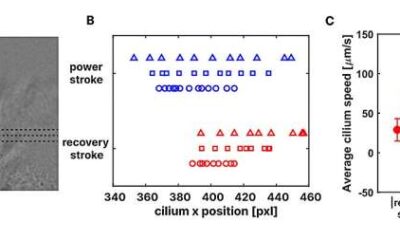Science
Researchers Develop Smart Material to Target Arthritis Treatment

Researchers at the University of Cambridge have created a groundbreaking smart material capable of sensing changes within the body, particularly during arthritis flare-ups, and delivering medication exactly when and where it is needed. This innovative material responds to slight variations in pH levels, which occur when a joint becomes inflamed during these episodes.
The newly developed material can be loaded with anti-inflammatory drugs that are released as the acidity in the affected joint increases. Typically, during an arthritis flare-up, the acidity surrounding a joint rises, prompting the material to soften and transition into a jelly-like state. This transformation triggers the release of drug molecules encapsulated within its structure, ensuring localized treatment.
The team, led by Professor Oren Scherman in the Yusuf Hamied Department of Chemistry, aims to use this material as an artificial cartilage replacement. This innovation could provide continuous therapy for arthritis, effectively reducing pain and inflammation for the over 10 million people affected by arthritis in the UK, which costs the NHS approximately £10.2 billion each year. Globally, the condition impacts more than 600 million individuals.
Dr. Stephen O’Neill, the first author of the study, emphasized the potential of this material to enhance patient quality of life. He stated, “These materials can ‘sense’ when something is wrong in the body and respond by delivering treatment right where it’s needed,” suggesting that this could minimize the need for repeated medication doses.
Innovative Design and Mechanism
The smart material employs specially engineered, reversible crosslinks within a polymer network that react sensitively to changes in acidity. This unique design endows the material with highly responsive mechanical properties, making it suitable for targeted drug delivery.
Professor Scherman noted, “For a while now, we’ve been interested in using these materials in joints, since their properties can mimic those of cartilage. But to combine that with highly targeted drug delivery is a really exciting prospect.” The research was published in the Journal of the American Chemical Society.
Laboratory tests involved loading the material with a fluorescent dye to simulate drug behavior. The results indicated that at acidity levels typical of an arthritic joint, the material released significantly more drug cargo compared to healthy pH levels. Dr. Jade McCune, a co-author, explained, “By tuning the chemistry of these gels, we can make them highly sensitive to the subtle shifts in acidity that occur in inflamed tissue.”
Future Potential and Applications
The researchers believe this approach could be adapted for various medical conditions by adjusting the material’s chemistry. O’Neill remarked on the versatility of the system, stating, “It’s a highly flexible approach, so we could in theory incorporate both fast-acting and slow-acting drugs, and have a single treatment that lasts for days, weeks, or even months.”
Next steps for the research team involve testing the materials in living systems to assess their performance and safety in physiological environments. If successful, this innovative approach has the potential to usher in a new generation of responsive biomaterials capable of treating chronic diseases with greater precision.
Support for this research came from the European Research Council and the Engineering and Physical Sciences Research Council, part of UK Research and Innovation. Professor Scherman is also a Fellow of Jesus College, Cambridge.
-

 World1 month ago
World1 month agoCoronation Street’s Shocking Murder Twist Reveals Family Secrets
-

 Entertainment1 month ago
Entertainment1 month agoAndrew Pierce Confirms Departure from ITV’s Good Morning Britain
-

 Entertainment6 months ago
Entertainment6 months agoKate Garraway Sells £2 Million Home Amid Financial Struggles
-

 Health5 months ago
Health5 months agoKatie Price Faces New Health Concerns After Cancer Symptoms Resurface
-

 Entertainment5 months ago
Entertainment5 months agoAnn Ming Reflects on ITV’s ‘I Fought the Law’ Drama
-

 World2 months ago
World2 months agoBailey Announces Heartbreaking Split from Rebecca After Reunion
-

 Entertainment1 month ago
Entertainment1 month agoDavid Jason and Nicholas Lyndhurst Eye Reunion for Only Fools Anniversary
-

 Entertainment2 months ago
Entertainment2 months agoCoronation Street Fans React as Todd Faces Heartbreaking Choice
-

 Entertainment2 months ago
Entertainment2 months agoBradley Walsh Sparks Strictly Come Dancing Hosting Speculation
-

 Entertainment1 month ago
Entertainment1 month agoTwo Stars Evicted from I’m A Celebrity Just Days Before Finale
-

 Entertainment5 months ago
Entertainment5 months agoCoronation Street’s Carl Webster Faces Trouble with New Affairs
-

 World1 month ago
World1 month agoKevin Sinfield Exceeds Fundraising Goal Ahead of Final Marathons

















